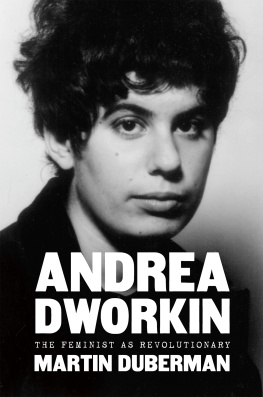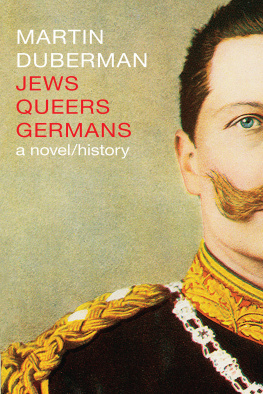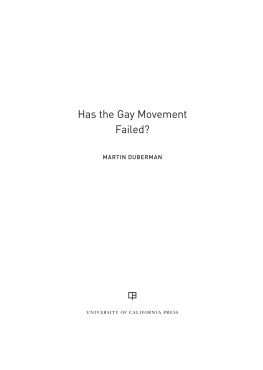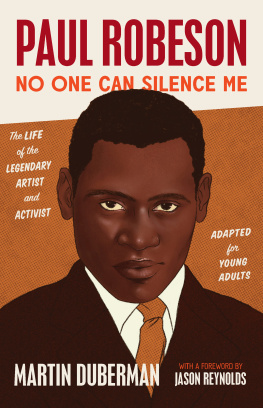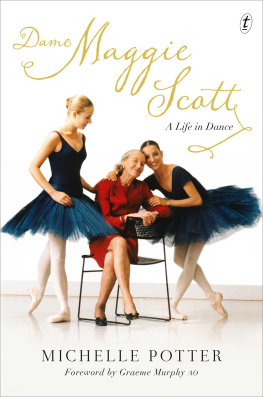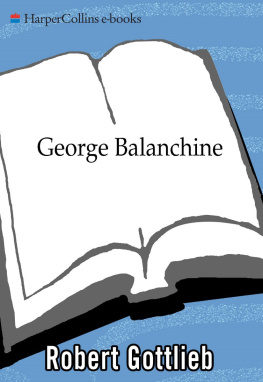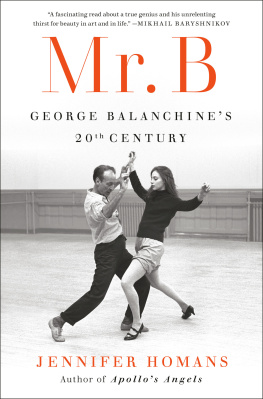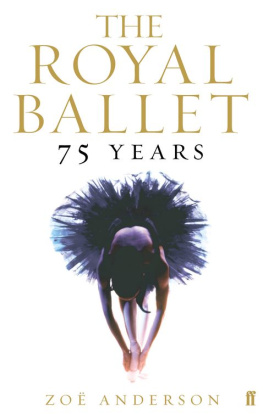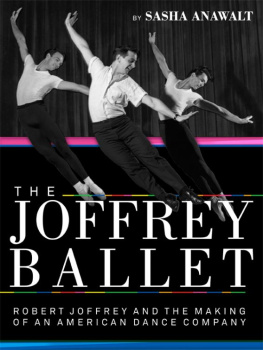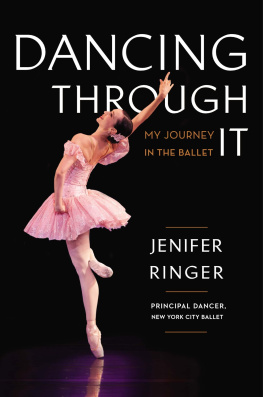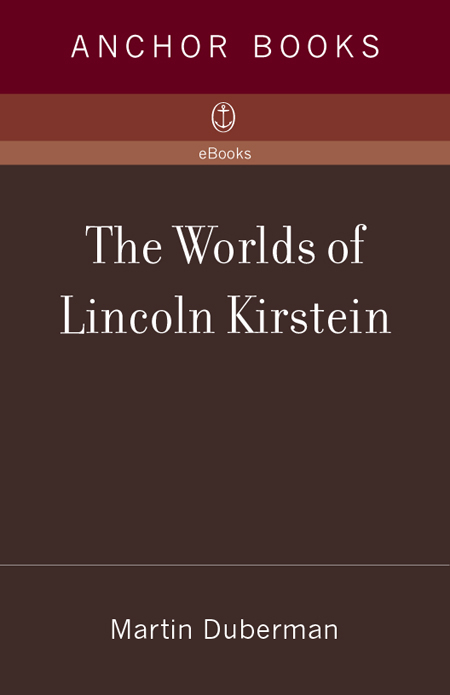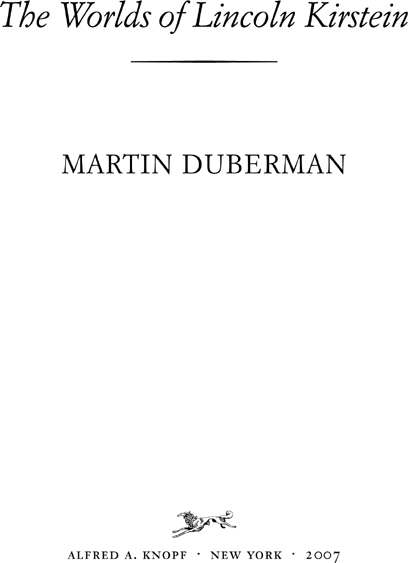ALSO BY MARTIN DUBERMAN
NONFICTION
Left Out: The Politics of Exclusion (Essays 1964 2002)
Queer Representations, ed.
A Queer World, ed.
Midlife Queer: Autobiography of a Decade, 1971 1981
Stonewall
Cures: A Gay Man's Odyssey
Hidden from History: Reclaiming the Gay and Lesbian Past, co-ed.
Paul Robeson: A Biography
About Time: Exploring the Gay Past
Black Mountain: An Exploration in Community
The Uncompleted Past
James Russell Lowell
The Antislavery Vanguard
Charles Francis Adams, 1807 1886
DRAMA
Mother Earth: An Epic Drama of Emma Goldman's Life
Visions of Kerouac
Male Armor: Selected Plays, 1968 1974
The Memory Bank
In White America
FICTION
Haymarket
Again, for Eli
and the blessings of continuity
CONTENTS
PART ONE

Youth
CHAPTER ONE
Growing Up
(19071926)
W HEN R OSE S TEIN told her family in the summer of 1893 that she wished to marry Louis Kirstein, she met with instant and strenuous opposition. The Steins, after all, were among Rochester's most prominent Jewish families, partners in the flourishing Stein-Bloch men's clothing company, pillars of the communityeven if, but one generation back, their mother had been a wet nurse in Posen, Germany.
Who was this Louis Kirstein? A nobody in the Steins' view, a large, coarse-looking man with limited education and incomeand even more limited prospects. He did currently hold down a salesman's job for an optical firm, but though admittedly bright, congenial, and ambitious, he hadn't found work that genuinely engaged him or offered promise of a secure future. Nor did his history inspire confidence that he ever would.
Alarming tales had reached the stodgy Stein clan: Kirstein, it seemed, had only a grammar-school education, had left home at sixteen, ridden the rails as a hobo, worked as a janitor in a St. Louis brothel, and once been held in jail overnight for trying to peddle a worthless patent medicine. He had, though still in his late twenties, already gone bankrupt three times once as part owner, player, and manager of a bush-league baseball team.
The words sporting type, maverick, and outsider clung to his name: he was said to like fine Cuban cigars (Corona Coronas) and well-tailored clothes, was a habitual (and lucky) poker playerand wasn't an observant Jew. Not that the Steins were, either, but somehow Louis should have been, given his otherwise unorthodox ways. No, Rose was told, the match was entirely unsuitable.
But Rose refused to yield. She felt certain that the man she'd fallen for couldn't be summarized by his hard-luck past, nor could his earlier mis-steps be taken as an accurate gauge of his character. The Louis Kirstein she knew was a charismatic man of integrity and generosity, a man of shrewd intelligence, unflagging optimism, and a tremendous appetite for life. Far from being a sporting type, he believed strongly in the ideal of servicein using one's gifts and good fortune in behalf of those less fortunate. And, far from being a fancy man, he adhered to standard middle-class values of hard work, civic-mindedness, and devotion to family. No, she would not give him up. (Nor would she be at all surprised when, within a decade, Louis would begin a rapid ascent to wealth and influence.)
Rose's obstinacy was not an entire surprise to her family. Though she'd grown up a conventional enough child, and was now seemingly content with the decorous confines of well-to-do womanhooda keen interest in fashion, embroidery and lace, museumgoing, the arts and concertsher six siblings had been warned at an early age, so one of them later remembered, never to cross Rosie because she might have one of her crazy tantrums. Her daughter Mina would later write of her, She was not given to revealing her feelings, only exploding when they were injured.
Ultimately Rose's parents gave their reluctant consent to an engagement. But they stipulated that marriage could not take place for three years, during which time they confidently expected their daughter to change her mind. She didn't. When the three-year waiting period was up, in January 1896, she and Louis quietly wedand promptly moved to Boston. This further aggravated family disapproval. Rose's parents didn't cut her off, but when she gave birth to her first child, Mina, a year later, it was not her own mother who came down from Rochester to stand by but rather Louis's widowed mother.
Once settled in a modest rented apartment, Louis went to work for the well-established opticians Andrew J. Lloyd & Company, and began to spend considerable time on the road selling eyeglasses. His own father, Edward, had been a lens grinder in Jena, near Leipzig, a city that for a time had been a center of liberal thought and home to Fichte, Hegel, and Schiller. Edward and his wife, Jeanette, had been adherents of the revolutionary uprising of 1848, and in the wake of its failure, had fled Germany, along with hordes of like-minded social radicals, for the United States. There Edward had found work with the Bausch and Lomb optical company in Rochester, the same city where, some dozen years later, Rose's father, Nathan Stein, became a wealthy manthanks to contracts he secured during the Civil War to make uniforms for the Union army (uniforms, it was widely rumored, that were cut from shoddy material).
The Steins' ongoing condescension to Louis dissipated somewhat with the birth of Mina, in 1897; to them it apparently signified seriousness and permanence. The renegade couple was invited to return to Rochester, and Louis offered employment with the family company, Stein-Bloch. He took his time accepting: the Steins had treated him as unworthy, and Louis had a settled sense of self-regard.
Still, he missed his mother, who'd remained in Rochester, living modestly in a small gray frame house in a decaying section of the city. Kindhearted, politically liberal, courageous (she was crippled with arthritis but never complained), and cultivatedher special passions were Goethe and HeineGrandma Kirstein was the only religious member of the family; she read the Old Testament in German, prayer books in Hebrew, and insisted that Louis attend synagogue on Rosh Hashanah and Yom Kippur. Despite her limited means, Grandma Kirstein (who died in 1914) would treat visitors to a spread of marzipan, pretzels, Apfelstrudel, and licorice sticks. Should Louis be in town, his favorite preserve, quince jelly, would be served, and should Mina accompany him, Grandma made her favoriteKchelchen, little drops of sponge cake dipped in fat.
An additional reason for returning to Rochester was that Rose also missed her family, and especially two of her sisters, Molly and Jane. (She felt less close to her other siblings, and downright distant from her two difficult, somewhat showy bachelor brothers, one of whom summered in a palatial cottage and the other notoriously not nice to his female help.)
In 1901 the Kirsteins finally decided to return to Rochester, and Louis accepted a job with Stein-Bloch as a traveling salesman. They moved into a modest-size house on Portsmouth Terrace, around the corner from Rochester's most elegant street, East Avenue, which boasted the pillared mansion of George Eastman, inventor of the box Kodak camera. Louis had once worked for Eastman and became a personal acquaintance; it was rumored that he'd rejected Eastman's offer to join the Kodak firm, convinced that the new toy was a passing fad.


